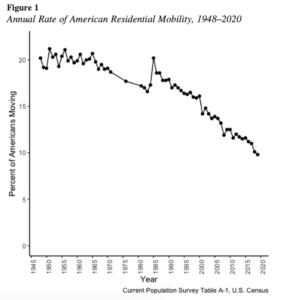One reason there’s so few houses for sale is because Americans simply don’t move anymore.
That may not be entirely voluntary. “Americans, it seems, are finding themselves increasingly locked into places that they wish to escape,” two psychologists wrote in a study of residential stagnation.
As the chart at bottom shows, residential mobility has steadily trended downward.
And while you might assume that people move for job reasons, there’s no link to economic booms and busts evident in this chart.
The study authors, who are psychologists, think cultural and social factors are behind it. These used to be called “roots.” We’re more comfortable in familiar surroundings, with people we know, and where we have connections. In a new town, we’re outsiders, and unsure of where we fit into the social hierarchy; that’s the stuff of literature and movies. It’s uncomfortable.
That’s less of an issue in big cities, where it’s easier to disappear or blend in. But city people are moving less, too. That may be due to declining upward mobility.
Whatever’s behind it, it’s powerful. “Even as localized recessions (that would have previously sent people running for economic opportunity elsewhere) hit, people stay put. Even as wage premiums for college degrees and higher-paying jobs concentrate in a handful of cities, low-income workers remain in stagnating pockets of the country,” an economist writes. (Me: Appalachia being a classic example.)
Part of it, he says, is due to zoning regulations that limit housing supply; another piece is “occupational licensing requirements.” By that he means, “regulations make it really hard for workers like cosmetologists or contractors to move to different states due to the financial and time costs of getting a new license.” He notes that in 1970 only 10% of U.S. workers needed such license for their jobs, but now that’s 25%.
Demographics also are a factor. As people age, they’re less upwardly mobile, less likely to move for job reasons, and more inclined to stay put.
He expects the trend of people staying put to intensify. The U.S. population continues to age. And even among younger people, given increasing economic and other barriers to mobility, “interstate mobility could continue to decline and the US might reach a … future where to move, you have to be rich.”
Interestingly, he says megachurches are a “cultural response” to mobility because they’re “relatively good at getting people integrated into a community … they’re big, they don’t take a lot of time, and they get you into a deep community quickly without having to incur a lot of costs.”
As for the benefits of moving, he cites an interesting experience in Iceland, where volcanic activity destroyed some of the homes in a town, and those who relocated rather than return to the community doubled their incomes over time. A better job, with more pay, was a traditional motivator of American mobility. I’m thinking that now, as remote working becomes more practical, that’s shifting to lifestyle choices (for example, a desire to avoid crowded cities).
The economist sees a bigger issue developing than just a tighter housing market — a social issue. He say America’s aging and stay-in-place syndrome is “biasing our political and cultural institutions against risk-taking, new ideas, and new groups of people.” The problem with that, he says, is, “Further tilting the scales against openness and dynamism could mean dwindling social and economic mobility and generations of Americans growing up in a country where freedom of movement belongs only to the rich.”
And, I would add, increasing homogeneity of ways of thinking. Specifically, the intensifying division of America into “blue states” and “red states,” and “urban versus rural.” Think about it: How many Republicans do you know, if you’re a Democrat; or how many Democrats do you know, if you’re a Republican? I’ll bet not many.
But it also comes back to the practical question: Even if you want to move, how the heck do you buy a house if no one is selling?
Read the article here.

